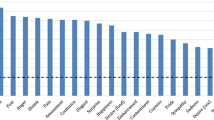Abstract
Brosnan's research on chimpanzees and capuchin monkeys provides invaluable clues to unlocking the complex nature of human morality. Elaborating upon her claims, we explore the role of emotions in basic social interactions, social regulation processes, and morality, all of which may be crucial to both human and nonhuman communities. We then turn to a conceptualization of teasing and play as forums for negotiating norms and the boundaries of acceptable behavior, and focus on the role of emotions in assessing the moral character of others. Finally, we consider points of convergence and departure between human responses to relative deprivation and those observed by Brosnan in primates. We conclude that work such as Brosnan's paves the way for fruitful collaborations between scholars of morality from diverse fields.
Similar content being viewed by others
References
Apte, M. L. (1985). Humor and laughter: An Anthropological Approach, Ithaca, NY: Cornell University Press.
Batson C. D., Shaw L. L. (1991). Evidence for altruism: Toward a pluralism of prosocial motives. Psychol. Inquiry 2:107–122
Brosnan, S. F. (2006). Nonhuman species’ reactions to inequity and their implications for fairness. Soc. Justice Res., this issue
Brown P., Levinson S. C. (1987). Politeness – Some Universals in Language Usage. Cambridge: Cambridge University Press
Crosby F. (1976). A model of egoistical relative deprivation. Psychol. Rev. 83: 85–113
Demuth K. (1986). Prompting routines in the language socialization of Basotho children In: B. B. Schieffelin, E. Ochs (Eds) Language Socialization across Cultures. Studies in the Social and Cultural Foundations of Language. 3. New York: Cambridge University Press, pp. 51–79
Dunbar R. I. M. (1996). Grooming, Gossip, and the Evolution of Language. London: Faber & Faber
Eder D. (1991). The role of teasing in adolescent peer group culture. Sociol. Stud. Child Develop. 4:181–197
Frank R. H. (1988). Passions within Reason: The Strategic Role of the Emotions. New York: W.W. Norton & Co
Gonzaga G. C., Keltner D., Londahl E. A., Smith M. D. (2001). Love and the commitment problem in romantic relations and friendship. J. Pers. Soc. Psychol. 81:247–262
Greene, J., and Haidt, J. (2002). How (and where) does moral judgment work? Trends Cogn. Sci. 6: 517–523
Greene J. D., Sommerville R. B., Nystrom L. E., Darley J. M., Cohen J. D. (2001). An fMRI investigation of emotional engagement in moral judgment. Science 293:2105–2108
Greenwald A. G. (1980). The totalitarian ego: Fabrication and revision of personal history. Am. Psychol. 35:603–618
Haidt J. (2001). The emotional dog and its rational tail: A social intuitionist approach to moral judgment. Psychol. Rev. 108:814–834
Hertenstein, M., Apps, B., and Keltner, D. (2006). Touch and the communication of emotion. Manuscript submitted for publication
Jost J. T., Banaji M. R. (1994). The role of stereotyping in system-justification and the production of false consciousness. Br. J. Soc. Psychol. 33:1–27
Keltner D., Capps L., Kring A. M., Young R. C., Heerey E. A. (2001). Just teasing: A conceptual analysis and empirical review. Psychol. Bull. 127:229–248
Keltner, D., Haidt, J., and Shiota, M. (In press). Social functionalism and the evolution of emotions. In Simpson J., and Kenrick, D. (eds.), Handbook of Evolutionary Social Psychology
Keltner D., Young R. C., Heerey E. A., Oemig C., Monarch N. D. (1998). Teasing in hierarchical and intimate relations. J. Person. Soc. Psychol. 75:1231–1247
Lerner M. J. (1980). The Belief in a Just World: A Fundamental Delusion. New York: Plenum
Lerner J. S., Goldberg J. H., Tetlock P. E. (1998). Sober second thought: The effects of accountability, anger, and authoritarianism on attributions of responsibility. Pers. Soc. Psychol. Bull..24:563–574
McCullough M. E., Kilpatrick S. D., Emmons R. A., Larson D. B. (2001). Is gratitude a moral affect? Psychol. Bull. 127:249–266
Oveis, C., Horberg, E. J., and Keltner, D. (2006). Compassion as a moral intuition: The social cognitive consequences of other- and self-orienting positive emotions. Unpublished manuscript
Rozin P., Markwith M., Stoess C. (1997). Moralization and becoming a vegetarian: The transformation of preferences into values and the recruitment of disgust. Psychol. Sci. 8:67–73
Rozin P., Lowery L., Imada S., Haidt J. (1999). The CAD triad hypothesis: A mapping between three moral emotions (contempt, anger, disgust) and three moral codes (community, autonomy, divinity). J. Pers. Soc. Psychol. 76:578–586
Schieffelin B. (1986). Teasing and shaming in Kaluli children’s interactions In: B. B. Schieffelin, E. Ochs (Eds) Language Socialization across Cultures. Studies in the Social and Cultural Foundations of Language. 3. New York: Cambridge University Press, pp. 165–181
Schieffelin B. (1990). The Give and Take of Everyday Life – Language Socialization of Kaluli Children. Cambridge: Cambridge University Press
Vasquez K., Keltner D., Ebenbach D. H., Banaszynski T. L. (2001). Cultural variation and similarity in moral rhetorics: Voices from the Philippines and the United States. J. Cross-Cultural Psychol. 32:93–120
de Waal, F.B.M. (1996). Conflict as negotiation. In McGrew, W.C., Marchant, L.F., and Nishida, T. (eds.), Great ape societies, Cambridge University Press, New York, pp. 159–172.
Walker I., Pettigrew T. (1984). Relative deprivation theory: An overview and conceptual critique. Br. J. Soc. Psychol. 23:301–310
Author information
Authors and Affiliations
Rights and permissions
About this article
Cite this article
Keltner, D., Horberg, E.J. & Oveis, C. Emotional Intuitions and Moral Play. Soc Just Res 19, 208–217 (2006). https://doi.org/10.1007/s11211-006-0006-8
Published:
Issue Date:
DOI: https://doi.org/10.1007/s11211-006-0006-8




